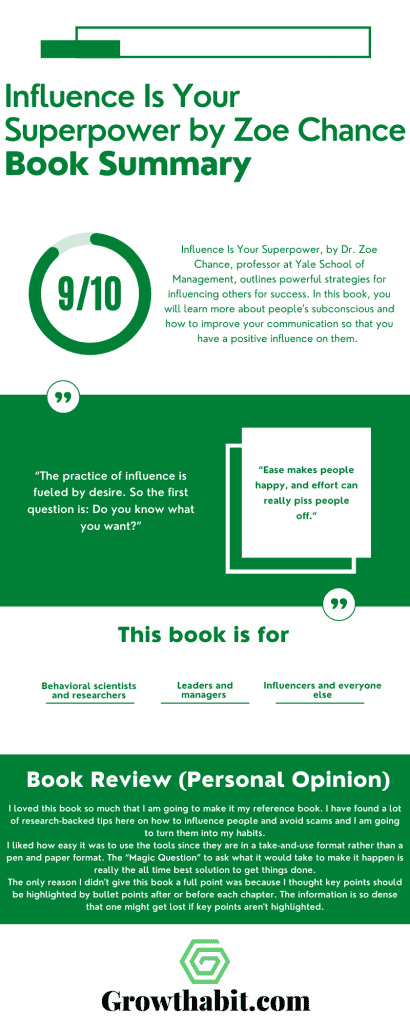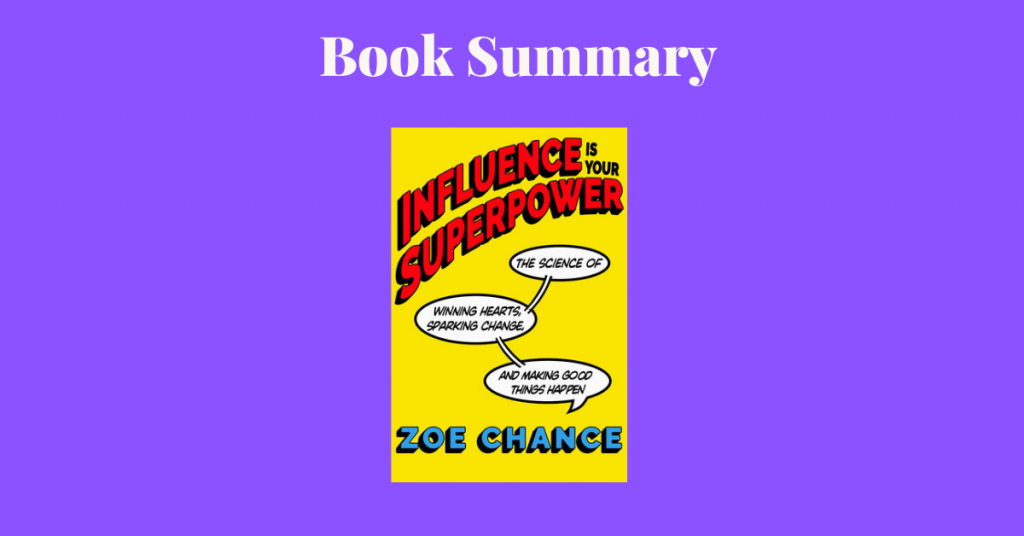Influence Is Your Superpower, by Dr. Zoe Chance, professor at Yale School of Management, outlines powerful strategies for influencing others for success. In this book, you will learn more about people’s subconscious and how to improve your communication so that you have a positive influence on them.
Book Title: Influence Is Your Superpower: The Science of Winning Hearts, Sparking Change, and Making Good Things Happen
Authors: Zoe Chance
Date of Reading: April 2022
Rating: 9/10
What Is Being Said In Detail:
Influence Is Your Superpower is a book that explains what invisible forces actually influence behavior. Here you’ll find insights from research in social psychology, behavioral economics, law, public health, marketing, and neuroscience.
To help you influence people for good, you will find useful tools like “The Magic Question” and “The Kindly Brontosaurus.”. You’ll learn how to “shine” onstage, how to negotiate effectively and how to spot liars before it’s too late.
Throughout each of the whole-number chapters, you’ll learn about strategies, science, and stories about a big influence topic like charisma, resistance, or negotiation. On the other hand, the half chapters tackle a single topic.
You can read the chapters in any order, so follow your curiosity.
Becoming Someone People Want to Say Yes To
Chapter 1 introduces the structure and content of the book and discusses the concept of influencing others. You will learn what the most common misconceptions are about influence and how you can use it to transform your life.
Searching for Temul
Chapter 1&1/2 explains the link between influence and desire. To unleash your creative force ‘temul’, you have to figure out what you really want, then put temul into action.
Influence Doesn’t Work By The Way You Think
Chapter 2 breaks down some common myths about how decisions are made. The bottom line is that you can understand, predict, or influence other people’s behavior by understanding their subconscious snap judgments.
The Path Of Least Resistance
Chapter 2&1/2 explains how to overcome resistance in people you are trying to influence. If you want people to do what you tell them, make it easy for them.
The No That Saved The World
Chapter 3 explains why being generous makes you successful, how to distribute your kindness, how to say no effectively, and when to say it. You will learn how to become comfortable saying no and accepting no without feeling rejected by others.
Just Ask
Chapter 3&1/2 explains how you can gain others’ attention and trust by asking for their help, advice, or favors.
The Curious Qualities Of Charisma
Chapter 4 explains what charisma is and how to develop it and use it to influence others. Focus on the people you want to influence rather than on yourself, and you will find a way to connect with them and influence them.
Moments Of Truth
Chapter 4&1/2 explains that choosing the right time over choosing the right manner to ask is more important, as well as knowing when to approach people when they are more open to your influence.
The Life Changing Magic Of Simple Frames
Chapter 5 explains how to frame things better to achieve a lasting effect. Frames that emphasize that it’s important, not that difficult, and attract subconscious attention are the most effective.
What Business Are You In
Chapter 5&1/2 illustrates how you can influence people without having to force them to do anything instead simply engaging them in conversation or the situation. You will have more success engaging people if you let them make their own choices while focusing on managing the situation.
Inner Two-Year-Olds
Chapter 6 explains why people show resistance and how to get past it without making them feel pressured. People are only willing to accept your influence if they feel as though their freedom of choice is not being limited and they own their actions.
Deep Listening
Chapter 6&1/2 shows you how to influence the other person by focusing on him or her. It will help you make a lasting impact if you see things from their perspective.
Creative Negotiations
Chapter 7 gives practical tips and influence strategies such as “Magic Question” and Face-Saving Plan B. You’ll learn how to negotiate with difficult people and how to influence them even when you appear submissive but don’t want to give the impression that you’re dependent on them.
Negotiating While Female
Chapter 7&1/2 focuses on the challenges women encounter in negotiations and when attempting to influence others. Here you will learn how to successfully negotiate with your employer to get what you want out of them and how to deal with the gender pay gap.
Defense Against the Dark Arts
Chapter 8 describes how to avoid being scammed and what are the types of manipulation that make it difficult to think clearly.
Angels and Demons
Chapter 8&1/2 tells a story from the personal experience of the author to emphasize the importance of defending yourself when you find yourself being pressured into doing something you don’t want.
Dreaming Bigger and Better
Chapter 9 shows it is possible to have a profound effect on the entire nation and even the world. It describes how a public political debate was first conceived and implemented in Tunisia, reinforcing democracy after centuries of closed Arab tradition.
You, Me, We
Chapter 9&3/4 discusses the power of community and how to come together and influence the world.
Most Important Keywords, Sentences, Quotes:
CHAPTER ONE – Becoming someone people want to say yes to
“Interpersonal influence is our human advantage, passed down in our DNA. It is what allowed our species to band together, work together, and span the globe. It will remain our advantage in an increasingly digital world, for as long as people are in charge. It has given you the success you already have, and it’s the path to what you’re still hoping to do.”
“When people are asked if they’d like to be more influential, they say yes—because influence is power. Being influential gives us the ability to create change, direct resources, and move hearts and minds. It acts like gravity, pulling us together into relationships.”
“When you become someone people want to say yes to, you are heavily rewarded. Money might not be your top priority, but it helps you get other things done, and it can be a benchmark for influence.”
CHAPTER ONE AND A HALF – Searching for Temul
“[…] temul is a creative force.”
“The practice of influence is fueled by desire. So the first question is: Do you know what you want?”
“You can’t be sure of what you want if you haven’t experienced it yet. To figure that out—and to really be sure—just experiment. And experience. Test your hypotheses. Test other people’s hypotheses.”
CHAPTER TWO – Influence Doesn’t Work the Way You Think
“Gators have evolved for maximum efficiency. […]. They don’t waste physical or mental energy. They ignore everything except immediate threats or easy opportunities. And they handle these risks and rewards according to instinctual rules that have helped their species survive for the past thirty-seven million years.”
“The Gator is responsible for every cognitive process that’s quick and requires negligible attention. This includes emotions, snap judgments, pattern recognition, and any behavior that has become easy or habitual through practice, like reading.”
“Judge is responsible for every cognitive process requiring concentration and effort. This includes planning, calculating, strategizing, interpreting, preventing errors, following complex instructions, and doing anything you’re not adept at yet.”
“We assume that if you want to change behavior—your own or someone else’s—you’ll need to build a persuasive case. Win over the mind and the behavior will follow. This seems obvious, but it’s completely off target. Perfectly understandable and utterly mistaken.”
“[…] most of daily life is driven by automatic, nonconscious mental processes—but it appears impossible…that conscious control could be up to the job.”
“[…] understanding, predicting, or influencing other people’s behavior should start with their Gator’s snap judgments.”
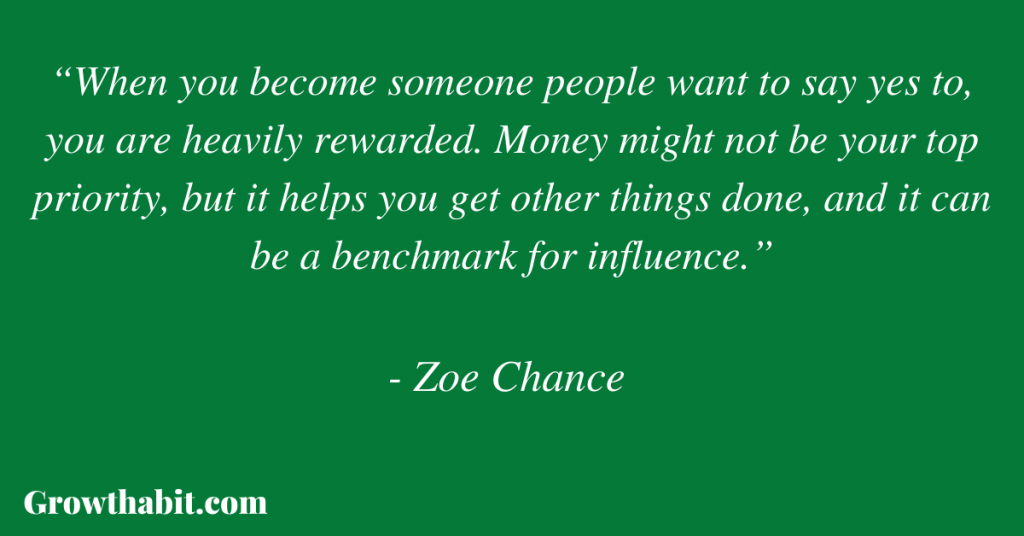
“While we tend to seek out information confirming that we’re right, we also tend to avoid information that might prove us wrong or make us unhappy.”
“Self-deception is an easy trap to fall into, and a difficult one to pull yourself out of.”
“Both the Gator and the Judge are responsible for what you’re thinking (consciously or not) and what you’re doing, but only the Gator is responsible for how you’re feeling.”
“Reason and logic are types of arguments. This means they are influence attempts. […]. You have the Judge arguing both sides, but only a subset of all possible facts, skewed by the biases of the Gator, will be considered. Preferences, preconceptions, stereotypes, and shortcuts ensure that the process of evaluating those facts will be biased. Every time. The best we can say is that the Judge tries not to be biased.”
CHAPTER TWO AND A HALF – The Path Of Least Resistance
“[…] telling people what’s good for them can make them want to resist your unsolicited advice.”
“The bedrock principle of influencing behavior is this: People tend to take the path of least resistance.”
“Ease is the single best predictor of behavior. Better than motivation, intentions, price, quality, or satisfaction.”
“Ease makes people happy, and effort can really piss people off.”
“If you want people to do more business with you, make it as easy as possible.”
“One easy place to begin influencing people to do something is to help them remember to do it.”
“Just as ease explains a vast number of things you do, effort explains a lot of the things you don’t do.”
“When your great idea means asking someone to take a leap of faith, you can be like Alex, leading them gently toward it, one baby step at a time.”
“Every journey starts with a baby step. How can you make the first step as close as possible to effortless for everyone—including you? How do you do the same for the next step, and the next, and the next one after that?”
CHAPTER THREE – The No That Saved The World
“Instead of trying to help all the people all the time with all the requests, successful givers reserve their generosity for givers and matchers, they block out time to get their work done, and they help in ways that energize them and make a unique contribution.”
“When we’re rewarded by parents, teachers, professors, and bosses for being “good,” we crave the dopamine hit of applause, a thank-you, a perfect score. But the people-pleasing habit can lead to chronic scarcity. Not enough time, not enough sleep, not enough money, not enough bandwidth to think clearly.”
“[…] a lot of us really love to help. If life has been good to us, we want to pay it forward. Or if life has dealt us a tough hand, maybe we want to protect other people from suffering like we did.”
“Kindness is admirable, but if we’re waiting for other people to ask, then we’re distributing our generosity unfairly.”
“When you don’t set boundaries around your generosity, your kindness saps your strength, diminishing your ability to be influential. Saying no creates vitally important limits.”
“Don’t let yourself become someone whose cheery façade masks your exhaustion and leaves you prone to lashing out. Don’t ignore your inner compass just to please someone else.”
“As we get more comfortable with saying no, we get more comfortable hearing no.”
“No is not fatal.”
“Small rejections can inoculate you against the paralyzing fear of rejection.”
“We possess a kind of “stress immune system,” so facing fears repeatedly without serious harm can inoculate us against stress.”
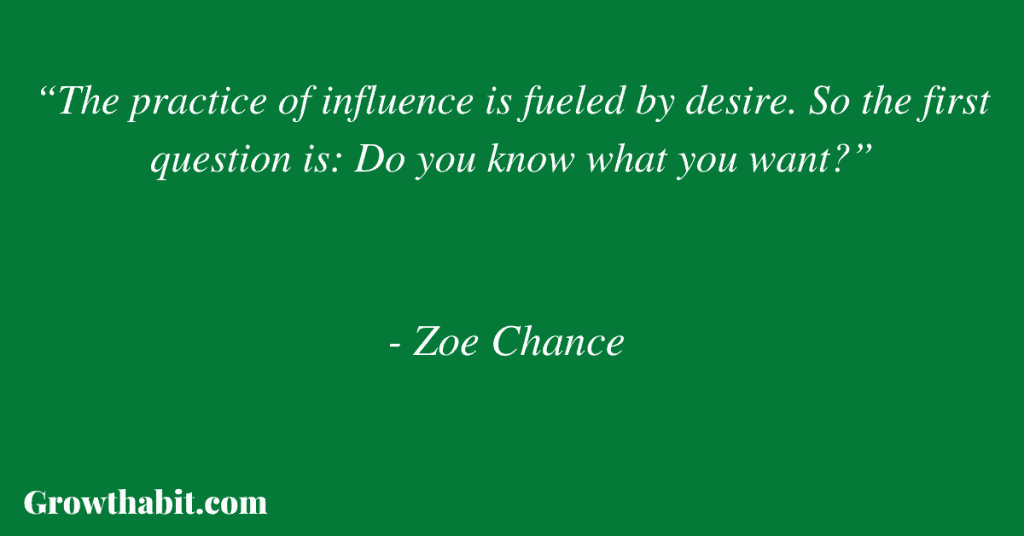
“When you say no, you assert your fundamental human right to decide how to live your life.”
“Saying no helps you be more open to hearing it, and when that happens, your requests lose that edge of neediness or fear of rejection that can repel other people.”
“When you’re clear about your own parameters and comfortable establishing them, you convey confidence and inspire trust. All the parties involved feel more relaxed, more free, and more open to the mutual benefits of influence.”
CHAPTER THREE AND A HALF – Just Ask
“[…] the easiest thing you can do to become more influential is just ask. Ask more often, ask more directly, and ask for more.”
“Multiple studies show that volunteers are happier and healthier than non-volunteers, and people tend to feel better about spending money on others than on themselves.”
“If you’re holding back from asking because you want to be liked, consider that you’re not giving other people the chance to feel good about saying yes to you. And consider that more of them would like to say yes than you think.”
“There are two reasons that people are more likely to say yes to a smaller request after having said no to a larger one: relative size and reciprocity.”
CHAPTER FOUR – The Curious Qualities of Charisma
“When someone lacks power, status, or agency, they tend to focus on their own experience: “I,” “me,” “my,” “mine.””
“Consistent self-focus usually arises from feelings of insecurity. When you feel vulnerable, you can’t help directing your attention inward.”
“Although no one will dislike you for diminishing yourself, they’re not going to like you for it either.”
“How can anyone connect with you when you’re so busy paying attention to yourself? The solution is simple, if not easy. Shift your focus to the other person.”
“When you meet people who are highly persuasive, oftentimes they take a tremendous interest in you.”
“Since we enjoy talking about ourselves, we appreciate people who invite us to do so.”
“Charisma isn’t something you are. It’s something you do, which places it within your control; you can become more charismatic by adjusting the way you interact with people.”
“When you feel like you belong onstage, then you do.”
“A pause, whether it’s momentary or stretched out, can realign the passage of time between you and your audience. They catch up with what you’ve just said. It’s one of the two big secrets to stage presence.
The second one is shining.”
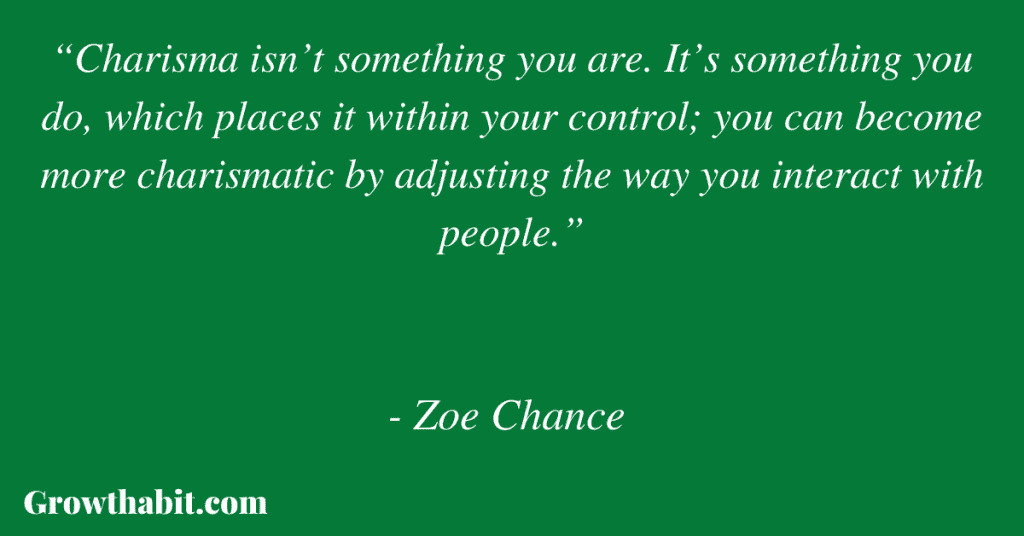
“To shine, you must be comfortable enough with your material that you can speak extemporaneously, or rehearsed enough that the words flow automatically. When the Gator is speaking the words, the Judge can be telling the rest of the body what to do.”
“Shining is the electric connection that gives someone the feeling of being the only other person in the room.”
“Charisma is all about connection.”
CHAPTER FOUR AND A HALF – Moments of Truth
“When you ask can sometimes matter more than how you ask or even what you’re asking for. Moments of truth are situations in which someone is particularly likely to be open to your influence.”
“An implementation intention is basically answering the question “Okay, so when and how are you going to do that?”
“Instead of trying to pull people away from whatever they’re doing, you’re finding a moment of truth in which to introduce something relevant. You’re seamlessly joining the conversation at just the right time and contributing to it instead of interrupting.”
CHAPTER FIVE – The Life-Changing Magic of a Simple Frame
“[…] effective frames can be so sticky that it becomes hard to see things from a different perspective.”
“When you decide to try framing things more consciously, it can be hard to know where to begin. There exist an infinite number of possible frames, but the three most useful are monumental, manageable, and mysterious. Each can be motivating in its own way.”
“[…] it’s not whether you frame an issue as monumental but how you do it that counts.”
“A monumental frame emphasizes why (It’s important!), and a manageable frame emphasizes how (It’s not that hard).”
“Mysterious frames attract the Gator’s attention. When it can’t fill in the missing details, it alerts the Judge to take on the case.”
CHAPTER FIVE AND A HALF – What Business Are You In?
“genuinely shift […] attention from myself to the students; at a party, it’s the guests who are important. […] a host isn’t in charge of her guests, she’s serving them. And a host isn’t telling anyone what to do, she’s just inviting people to take part in something wonderful.”
“Maybe you want to ask yourself how things might change if you were in the hospitality business. If not that, ask yourself, what “business” do you want to be in?””
CHAPTER SIX – Inner Two-Year-Olds
“You’re also up against a universal bias called loss aversion. When people evaluate opportunities for what they might gain versus what they would have to give up, they weigh losses far more heavily than gains.”
“We will do as much to avoid losing ten dollars as we will to gain twenty dollars.”
“For a change to feel worth it, it has to be really, really good.”
“What people most hate to give up is their freedom. Whenever a perceived liberty is taken away or threatened, we get upset and do whatever it takes to try to restore it. When we feel coerced to act in a certain way, we may respond not just by refusing but by doing the opposite thing.”
“We want freedom of choice, and when someone tries to limit it, we’re inclined to push back.”
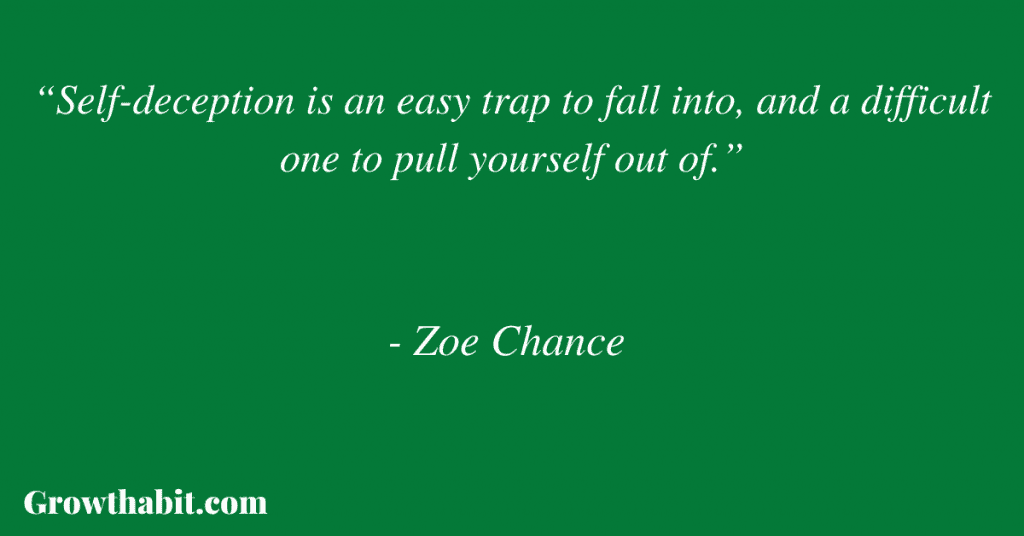
“Resistance wants to be witnessed.”
“By reading the other person’s mind and articulating the objection, you free their attention from the voice in their head so they can listen to you.”
“[…] if they do say yes without coercion, they’ll feel responsible for their choice. This makes them feel better about the decision they’ve made and helps that decision stick. Research shows that after complying with a gentle nudge to lie, for instance, people become more receptive to believing the lie.”
“You can affirm someone’s freedom of choice by asking for permission to ask.”
“Asking consent before sharing advice is an aikido move because while people are naturally resistant to pressure, they’re also naturally curious.”
“One of the best ways you can show respect while still being persistent is to ask if you can ask again. And when. Then, when you’re following up, you can say, “You mentioned it was okay for me to check in with you on Friday afternoon. Is this still a good time?””
CHAPTER SIX AND A HALF – Deep Listening
“After you have listened to someone with a specific goal in mind—understanding their thoughts, or feelings, or what’s been left unsaid, or their values, or all of these—and you reflect back your best guess without judgment, they’ll appreciate that you’re trying to understand them.”
“[…] we’re projecting opinions onto people when we haven’t actually listened to them.”
CHAPTER SEVEN – Creative Negotiations
“What would it take? I call this the Magic Question, and it’s my favorite influence strategy.”
“A negotiation is just a conversation aimed at coming to an agreement. That’s all it is. Everything you’ve learned about influence applies to negotiations. Timing, framing, handling resistance, all of it.”
“Most experienced negotiators look for mutually agreeable solutions. If the negotiation is over a pie, say, they’re not trying to bake a small one, eat it all, and leave you staring at crumbs. They’re looking to bake a big pie and sort out slices so everyone walks away full and happy.”
“[…] the real art of negotiation has less to do with what you say than it does with the mindset you bring and the preparation you’ve done before the conversation gets under way.”
“In the best negotiations, you walk out with an even better idea than the one you walked in with.”
“The questions to ask yourself, and to discuss with the other party when that makes sense, are: How could this be even better for me? How could it be even better for them? Who else could benefit?”
“Don’t prevent magic from happening by assuming it won’t.”
“In almost any negotiated agreement the key ingredients will be similar: dreams and data”
“Happy people are more generous and more creative, leading to better agreements and a greater likelihood of sticking to the bargain. In most cases, generosity inspires trust and reciprocation.”
“One of the simplest ways to inspire collaboration is to give the other person choices. Even if you think you know somebody’s best course of action, offering only one suggestion can lead them to feel pressured. Having options means they’re in control, which soothes their resistance.”
“The outcome of a negotiation with a difficult person (if you choose to follow through with it) comes down to identifying your leverage and communicating your wishes and boundaries clearly.”
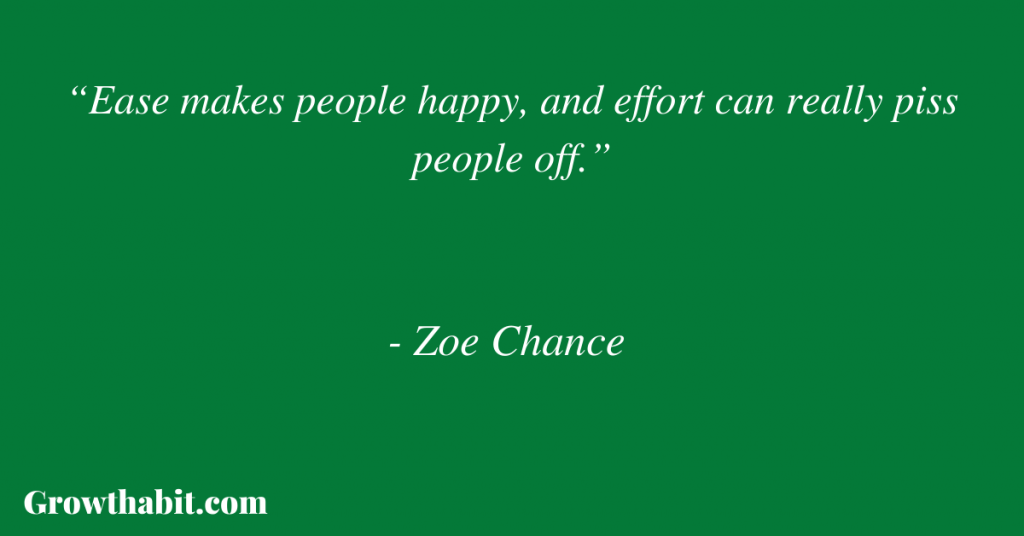
“When you have leverage you don’t need to do much, […]. Prepare so that you know what your outside options are, what you want, and where you’ll draw the line. Then tell the other person what you want and let it sit there.”
“When a difficult person drops the ball at your feet, calmly toss it back: Pause. “So, what you wan’ do?” Quietly establish your parameters and let them decide.“
“The strategy that prevents pride from getting in the way is Face-Saving Plan B. This approach demonstrates strength in a submissive posture. You refer to an alternative—or just let them know you have alternatives—while saying you hope it won’t come to that.”
CHAPTER SEVEN AND A HALF – Negotiating While Female
“[…] your outcome depends far more on how much you ask for than on how you ask.”
“[…] employers are willing to pay women as much as men; but we need to take responsibility for asking for as much as men do, as many times as it takes.”
CHAPTER EIGHT – Defense Against The Dark Arts
“Con artists and other manipulators intentionally stir up our emotions to ensure we can’t think clearly. What makes this worse is the fact that when you’re in the ether, you don’t know it.”
“Excitement, euphoria, anxiety, confusion, connectedness, or spiritual rapture: All of these states make it hard to think clearly.”
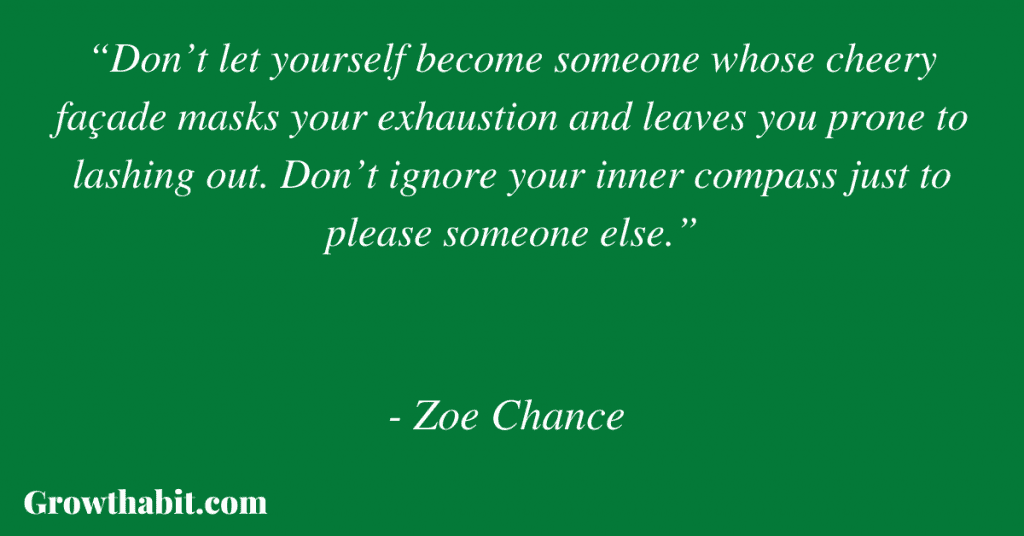
“Whenever you get a funny feeling about someone who’s trying to influence you, or if you notice one of the other red flags listed here, be on the lookout for more. Or just say no as firmly as necessary and walk away.”
CHAPTER EIGHT AND A HALF – Angels and Demons
“Being a nice person doesn’t mean you can’t defend yourself. And being a guardian doesn’t mean looking like an angel.”
CHAPTER NINE – Dreaming Bigger and Better
“While the study of influence is a science, the practice of influence is an art.”
CHAPTER NINE AND THREE-QUARTERS – You, Me, We
“Few of history’s turning points can credit just one hero. No one flew down in a cape or swung in on a strand of spider silk to save the world single-handedly. Instead, there was an army of angels who spread the word, saying, “Here’s what we’re going to do.” Or they just stepped up and did it.”
Book Review (Personal Opinion):
I loved this book so much that I am going to make it my reference book. I have found a lot of research-backed tips here on how to influence people and avoid scams and I am going to turn them into my habits.
I liked how easy it was to use the tools since they are in a take-and-use format rather than a pen and paper format. The “Magic Question” to ask what it would take to make it happen is really the all time best solution to get things done.
The only reason I didn’t give this book a full point was because I thought key points should be highlighted by bullet points after or before each chapter. The information is so dense that one might get lost if key points aren’t highlighted.
Rating: 9/10
This Book Is For:
- Leaders and managers
- Influencers and everyone else
- Behavioral scientists and researchers
If You Want To Learn More
Here’s an interview with Zoe Chance in which she discusses topics from Influence Is Your Superpower with Yale Center for Business and Environment:
How I’ve Implemented The Ideas From The Book
There are a lot of easy-to-use tips in here I’ve tested while reading this book. Asking “Magic Question” every once in a while really helped get things moving in my daily life.
I also tried the 24H No challenge, and it was hard. My problem is that I don’t like to say no to people because their reaction makes me feel even worse than when I get a no. Nevertheless, I know I can work it out with more practice.
Last but not least, I’m practicing deep listening, which is a lot of effort. If you listen attentively and with so much focus, you’ll get tired. You’ll need to plan ahead to keep your energy level up.
One Small Actionable Step You Can Do
Find the “Magic Question” in the book and practice it. You won’t even notice it but it will help you achieve your goals, big or small. Whether you’re at work, home, or running a business, this will be handy at any time.
